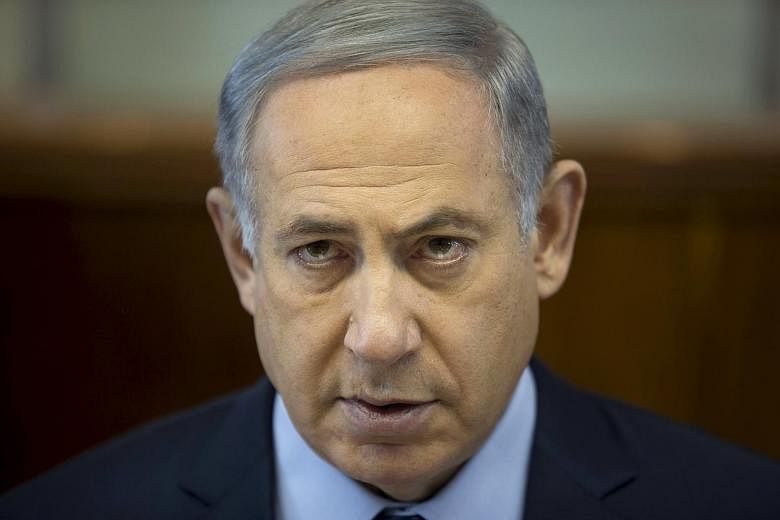JERUSALEM (AFP) - The rocky relationship between US President Barack Obama and Israeli Prime Minister Benjamin Netanyahu took a fresh hit Tuesday (March 8) over a declined White House invitation hours before Vice President Joe Biden's arrival.
Netanyahu's decision not to accept an invitation for talks with Obama in Washington later this month "surprised" the White House, which first learned of it through news reports.
The Israeli premier's office defended the decision by saying Netanyahu did not want to interfere in US presidential primary elections currently taking place.
Obama and Netanyahu have had a rocky personal relationship, worsened by the Israeli premier's forceful opposition to the Iran nuclear deal, including in a speech to the US Congress.
But the two have sought to set aside their disagreements in recent months and work out a new 10-year defence aid package for Israel as well as demonstrate that the ties between the two traditional allies remain strong.
Biden is due to arrive in Tel Aviv later on Tuesday and hold talks with Netanyahu on Wednesday. He is also scheduled to meet Palestinian president Mahmud Abbas.
A previous visit by Biden in 2010 was marred by the announcement of a major Israeli settlement project in annexed east Jerusalem.
The announcement drew a public scolding from Biden and it soured relations with Washington for months.
His visit this time comes with Obama having acknowledged that there will be no comprehensive agreement between Israelis and Palestinians before he leaves office in January 2017.
The White House has said that Biden will not be pursuing any major new peace initiatives during his visit, even though a wave of violence since October has killed more than 200 people.
Talks are expected to include discussions on a new, 10-year defence aid package for Israel, currently worth some US$3.1 billion (S$4.3 billion) annually in addition to spending on projects such as missile defence, illustrating the importance of Israel's relationship with the United States.
Biden and Netanyahu also plan to talk about the fight against the Islamic State group.
But while Obama has resigned himself to not achieving any major breakthrough in the Israeli-Palestinian conflict, there have been suggestions he may seek to somehow kickstart peace efforts at a complete standstill for two years.
That has included speculation that the United States could break with traditional practice and support a UN resolution related to resolving the conflict, which Israel strongly opposes.
The Wall Street Journal quoted senior US officials on Monday saying the White House is working on plans for reviving peace talks and for a possible resolution, which could be outlined at Obama's final appearance at the UN General Assembly in the autumn.
The United States has traditionally vetoed resolutions at the UN Security Council opposed by Israel.
"They are worried in Jerusalem that between the time of the election in November and the time that the actual president begins his term of office in January ... President Obama might do certain things that the PM won't like," Jonathan Rynhold of Israel's Begin-Sadat Centre for Strategic Studies told AFP.
At the same time, some analysts say they do not expect the United States to demand concessions from Israel toward Palestinians in connection with the new defence aid pact being negotiated.
A former Israeli ambassador to the US and ex-adviser to Netanyahu said completing the deal was in the interest of both countries due to the evolving threats to them in the Middle East.
It was important for both to have "a projection to the common enemies of Israel and the United States of a very strong - militarily strong - Israel," said Zalman Shoval.
"And therefore, I think these two things will not be linked." Biden's visit is part of a tour of the Middle East.
On Monday during a visit to the United Arab Emirates, he said Washington was going to have to "squeeze the heart out of" the Islamic State group in Syria and Iraq to wipe it out.
However, he also ruled out a military solution to end Syria's conflict and called for a political transition.
His comments came with President Bashar al-Assad's regime and its opponents set to resume UN-sponsored peace talks next week in Geneva as a fragile ceasefire holds in Syria.
After his visit to Israel and the Palestinian territories, Biden will travel to Jordan.
Senior Palestinian official Ahmed Majdalani said he was expecting nothing from Biden's visit.
"Mr. Biden is only coming to the region in the context of his plans regarding the fight against terrorism in Syria, not for us," he told AFP.

